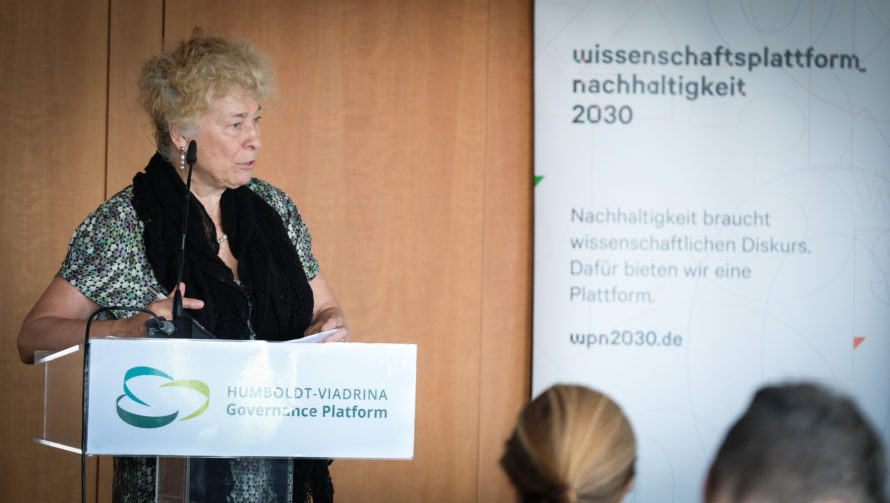19.06.2019

What must be done in Germany to support a shift towards more sustainable transportation and mobility systems that will contribute to efforts to achieve the global sustainable development goals? This question touches on numerous complex challenges – both technical, financial, infrastructural and societal in particular – that require broad discussion and debate. The Science Platform Sustainability 2030 (SPS2030) working group on mobility and the Humboldt-Viadrina Governance Platform hosted a trialogue event to explore these issues in Berlin on 19 June: “On the move: Making mobility sustainable and attractive”.
The findings of the SPS2030 working group on mobility were the basis of discussions. The trialogue focussed in particular on three issues identified by the working group as crucial for a broad transition towards sustainable transportation:
Dirk Messner fasst die Diskussionen des Trialogs zusammen.
Dirk Messner, Co-Vorsitzender der wpn2030, fasst die Diskussionen des Dialogs zusammen.
Gesine Schwan reflects the discussions of the trialogue.
Gesine Schwan, Präsidentin der HUMBOLDT-VIADRINA Governance Platform, reflektiert die Diskussionen des Trialogs.
The event, which was moderated by Gesine Schwan, President of the Humboldt-Viadrina Governance Platform, brought together perspectives from science policymaking and administration, business and civil society. Presentations were delivered by Dirk Messner (Science Platform Sustainability 2030), Helge Pols (Federal Ministry of Transport and Digital Infrastructure (BMVI)), Carl-Friedrich Eckardt (BMW Group), Susanne Henckel (Verkehrsverbund Berlin-Brandenburg) and Marion Jungbluth (Federation of German Consumer Organisations). Over 50 guests joined discussions in the plenary session and focus groups led by Ursula Mathar (BMW Group), Christian Hochfeld (Agora Verkehrswende) and Moritz Kirchesch (Federal Ministry of Food and Agriculture).
The urgent need for coherent and decisive action, in particular with respect to efforts to decarbonise the transport sector, was a recurring theme in discussions. The co-benefits of decarbonisation were also highlighted repeatedly. The potential benefits for public health of a shift towards greater use of ecomobility services and modes of transport (foot and bicycle traffic, public transport, etc.). Participants also emphasised the urgent need for policymakers, the business sector and civil society to work together to guide the development of new mobility services (car sharing, ride sharing etc.) so that these services are both sustainable and user-centred to the fullest extent possible.
An in-depth assessment of the trialogue is currently being prepared. The central findings of this event will contribute to the recommendations of the SPS2030 for future German sustainable development policy.
Insights into the trialogue